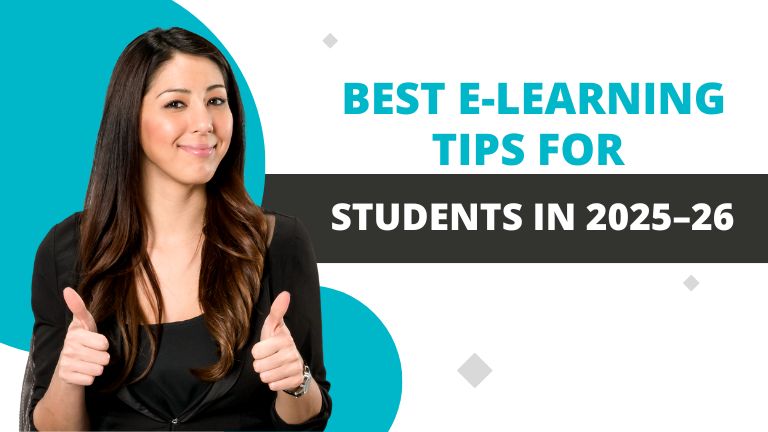The educational landscape has undergone a radical transformation, and e-learning now plays a pivotal role for students across all levels—from high school learners to university graduates and working professionals. Distance learning and virtual classrooms have become mainstream pathways for acquiring knowledge, skills, and qualifications in 2025–26. The massive growth of digital education, accelerated by the COVID-19 pandemic, has made flexibility, global access, and personalized learning more important than ever.
However, this shift also brings unique challenges such as distractions, lack of motivation, and screen fatigue. To help students succeed, here are the best e-learning tips and online study strategies for success in 2025–26 that make virtual learning more effective, engaging, and rewarding.
- Create a Dedicated Learning Space
Set up a quiet, comfortable study area that your brain associates with learning. Even a simple corner with good lighting, a desk, and a comfortable chair can boost focus. This dedicated spot reduces distractions from TV, gaming consoles, or unnecessary gadgets, helping maintain concentration during distance learning sessions. - Follow a Fixed Routine
Flexibility in online study doesn’t mean skipping structure. Design a routine mirroring traditional school or workdays with set times for lectures, assignments, and breaks. This consistency builds discipline, reduces procrastination, and balances academics with personal life for improved productivity. - Set Clear Goals and Track Progress
Self-motivation drives success in e-learning. Define weekly or monthly targets—finishing modules, mastering skills, or scoring well on tests. Use productivity apps like Notion, Trello, or Google Keep to organize tasks and keep track of academic progress, reducing overwhelm and boosting your focus. - Stay Engaged with Teachers and Peers
Online education doesn’t have to be isolating. Participate actively in live sessions, discussion forums, and group projects on your distance learning platform. Clear doubts with instructors and collaborate with peers to enrich your learning experience and build a virtual community. - Use Technology Wisely
Select tools and platforms that enhance your learning experience rather than distract. For example:
- Zoom or Google Meet for live classes
- Coursera, Udemy, and edX for specialized courses
- Grammarly or QuillBot for writing assistance
- Anki and Quizlet for effective memorization through flashcards
Using these purposeful tools amplifies learning efficiency and retention.
- Take Regular Breaks to Combat Screen Fatigue
Extended screen time can cause headaches and reduced focus. Use techniques like Pomodoro (25 minutes study, 5 minutes break) to maintain attention. Incorporate stretching, quick walks, or mindfulness meditation during breaks to refresh your mind and body. - Improve Time Management
Effective virtual learning strategies depend on managing time wisely. Prioritize your tasks with digital planners or simple to-do lists, and avoid multitasking which reduces efficiency. Concentrate on one subject or project at a time for deeper understanding and better results. - Stay Healthy—Physically and Mentally
Balancing screen time with physical health is crucial. Eat nutritious meals, exercise regularly, and maintain a consistent sleep schedule. Mental wellness is key—practice mindfulness and stay connected socially. Don’t hesitate to seek support if stress or isolation becomes overwhelming. - Avoid Distractions
Limit interruptions by using apps like Forest, Cold Turkey, or StayFocusd that block distracting social media and entertainment sites during study time. Success in online education 2025 depends heavily on discipline and mindful technology usage. - Revise and Practice Regularly
Online learning demands more self-review than traditional classrooms. Record lectures, take detailed notes, and revisit content often. Use quizzes, flashcards, and practice tests to reinforce what you’ve learned and prepare effectively for exams.
Pros and Cons of E-Learning in 2025–26
Pros:
- Flexible learning anytime, anywhere
- Access to global experts and top universities
- Cost-effective compared to traditional education
- Personalized learning through AI and adaptive technologies
- Wide variety of courses and skill-building opportunities
Cons:
- Limited face-to-face interaction
- Screen fatigue and health concerns
- Requires high self-motivation and discipline
- Fewer hands-on or lab-based experiences
- Possible technical disruptions during classes
Conclusion
The future of e-learning in 2025–26 shines bright, powered by technology and innovative online study strategies. While challenges like distractions and limited personal interaction exist, the flexibility, accessibility, and richness of digital education make it one of the best learning systems today. By applying these best e-learning tips for students, mastering time management, and engaging with virtual classrooms, learners can unlock their fullest potential and enjoy a rewarding, successful online education journey in 2025 and beyond.
ALSO READ
